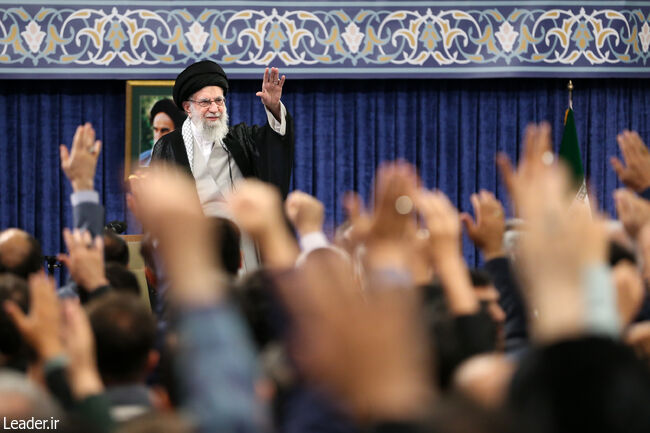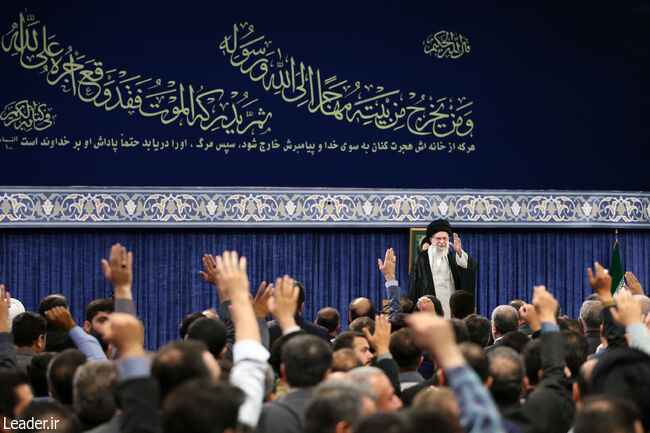In a meeting this morning with the families of Martyr Raisi, other Government Service Martyrs, and the families of martyred officials from recent decades, the Leader of the Islamic Revolution stated that the primary purpose of commemorating and honouring martyrs is to reflect on and learn from them. Elaborating on the heartfelt, verbal, and practical qualities of the martyred President, he added, "The beloved Raisi was the perfect embodiment of the characteristics an official in a divine government should have. He served the people with tireless effort, enhancing the nation's dignity, honour, and reputation. His path and method are profound lessons for all officials, youth, and future generations."
Ayatollah Khamenei also cautioned the American side in the indirect negotiations to refrain from baseless talk, emphasising, "The statements made by the Americans claiming, 'we will not allow Iran to enrich uranium' are sheer rubbish. The Islamic Republic will pursue its own policies and approach in this matter."
In this meeting, which was attended by a number of officials, he honoured the martyrs Ale Hashem, Amir-Abdollahian, the martyrs of the flight crew, the governor of East Azerbaijan, and the head of security, who, in the tragic incident of 20th May (30th Odibehesht) last year, joined Martyr Raisi in meeting their Lord. He added, "Maintaining a distance from Pharaonic rule and striving toward divine governance is a key criterion for managing the country and one that Martyr Raisi embodied in full."
Citing verses from the Qur'an, the Leader of the Revolution stated, "Self-aggrandisement, belittling the people, and shifting the burden of responsibility onto them are traits of Pharaonic rule; traits with which Martyr Raisi stood in complete contrast. He considered himself among the people, at times even lesser than them, and it was with this perspective that he governed the country."
The Leader said Martyr Raisi taught us a vital lesson: wholehearted dedication to serve God's servants (the people), and never exploiting one's political or social position for personal gain. He added, "In the Islamic system, those who possess such qualities are not few, but these traits and lessons must become part of public culture."
Ayatollah Khamenei said that a person's heart, speech, and actions are the three fundamental elements for understanding their character. He said, "Raisi had a heart that was humble and mindful of God, a tongue that was straightforward and truthful, and deeds that were tireless and constant."
He mentioned humility, supplication, reliance on his Lord, and intimacy with God as some of the traits that defined the late Raisi throughout all periods of his life, whether in or out of office. He added, "His heart overflowed with compassion for the people. Without ever complaining about their expectations or viewing them with suspicion, he remained constantly concerned with fulfilling his weighty responsibilities. That is, his heart was with God, with the people, and preoccupied with his Islamic responsibilities."
The Leader of the Revolution stated that fulfilling his divine duty was the primary reason Martyr Raisi accepted responsibility as the head of the judiciary and why he entered the presidential elections. He added, "Many claim to act out of duty, but we witnessed this as a genuine quality in him."
The Leader described Martyr Raisi's words in both the domestic and diplomatic arenas as "straightforward and truthful," adding, "Raisi took clear positions and never allowed enemies to claim they had brought Iran to the negotiating table through threats, enticement, or deception."
Ayatollah Khamenei stated that the other side continued to push for direct talks in order to create the impression that Iran was conceding and said, "Martyr Raisi never allowed them such an opening. While indirect talks did take place during his tenure, as they do now, they proved unsuccessful then, and we don't expect them to succeed now either. The ultimate outcome remains uncertain."
The Leader of the Revolution also warned the American side in the indirect negotiations to refrain from making baseless statements. He said, "This claim by the Americans that 'we will not allow Iran to enrich [uranium]' is utter nonsense. No one in this country is waiting for anyone's permission, and the Islamic Republic will continue to pursue its own policy and course." Referring to the insistence of the Americans and some Westerners on preventing uranium enrichment in Iran, he said, "On another occasion, I will speak to the people about what their real intentions and objectives behind this insistence truly are."
In this regard, Ayatollah Khamenei highlighted Martyr Raisi's honesty and straightforwardness, saying, "To grasp the importance of this quality, one needs only compare it to the deceitful rhetoric of certain Western officials. They deafen the world with their shouts about peace and human rights, yet deliberately ignore the slaughter of over 20,000 innocent children in Gaza while actively supporting the perpetrators of these crimes."
The Leader of the Revolution highlighted Martyr Raisi's exceptional work ethic and diligence as another distinguishing virtue. He said, "Martyr Raisi was wholly dedicated to work and effort. He was relentless, with no distinction between night and day in his constant drive to serve and deliver quality work. Even when we repeatedly advised him to be mindful of how the workload might affect his health, he would respond, 'I don't get tired of working.'"
The Leader described Martyr Raisi's diverse projects, such as water supply projects, road construction, job creation, revitalising idle or defunct factories, and completing stalled development projects, as direct and tangible contributions to the people's welfare. He added, "Martyr Raisi also contributed to the nation's dignity, honour, and reputation by elevating them."
Ayatollah Khamenei mentioned reports from international financial institutions that have shown Iran's economic growth rising from nearly zero at the start of the 13th Administration to nearly 5 per cent by its end as a source of national pride and a sign of the country's progress. He added, "Holding up the Qur'an or the photo of Martyr Soleimani at the UN General Assembly were among other actions by which Martyr Raisi has honoured the Iranian nation."
In a conclusion to his remarks, the Leader highlighted how the luminosity, spirit, motivation, and sense of responsibility of the martyred officials from the early years of the Revolution, such as the young colleagues of Martyr Rajaei, had been reproduced and manifested in the character and conduct of Martyr Raisi and many of his young associates. He described this phenomenon as immensely valuable and a testimony to the Revolution's enduring power, adding, "The continued nurturing of selfless and capable individuals by the Revolution is the Greatest Victory of our late Imam."
Ayatollah Khamenei observed that the martyrs of the May 2024 helicopter crash had either been children or had not yet been born during the victory of the Revolution. He counted the nurturing of these youths, and hundreds of thousands like them across the country, as one of the distinctions of the Islamic Revolution. He declared, "This is the power of the Islamic Revolution, that it can mobilise a 19-year-old like Arman Aliverdi along the same path where, 40 years prior, the 90-year-old martyr Ayatollah Ashrafi-Isfahani achieved martyrdom."
He emphasised that a revolution endowed with such enduring power and capacity for mobilisation is not one that can be defeated. He declared, "We must recognise the value of this Revolution, its power to cultivate human potential, the progress, and the monumental movement of the Iranian nation it has generated. We must seek the help of the Almighty to carry it forward, so that Iran's enduring lesson may flow forth and be firmly established as a source of guidance for humanity and other nations."



